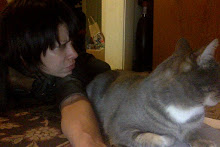Say you are a little kid, playing innocently with friends. Say you are approached by a police officer who proceeds to tell you that you are worthless, your family is worthless, and that you are going to end up in jail.
How would you feel? Would it incentivize you to respect authority and/or law enforcement?
Lets pretend you love your mom and your whole family. They are the ones who feed you, clothe you, tend to your wounds, and provide a roof over your head. Now put yourself in the position of hearing the police constantly bashing your family, purposely, just to get a rise out of you.
How can you grow up respecting authority when continually faced with those kinds of encounters?
I didn’t just make up this scenario. I witnessed it, as a little kid. I saw my friends treated that way. It didn’t happen to me. I was lucky enough to have a family that police did not bother. That luck kept me from experiencing the direct harassment many of my friends experienced. But it didn’t prevent me from witnessing it. I remember much of it vividly. They say experiences from childhood shape a lot of your world view. I saw that kind of treatment A LOT. A few stick out in my mind over others. I was pretty young when I watched the procession for Tyrone Childs, an unarmed Hia-Ced O'odham man shot by a scared rookie police officer. I was introduced to the dynamics and implications of the politics of fear early on. Maybe that is why I can see the problem so clearly, and for others, it is not so obvious.
I don’t know, to me its a no brainer. Its fairly obvious that if positions of authority systematically treat people disrespectfully from a young age, those kids grow up mutually disrespecting that authority.
The cops told my friends they’d end up in jail, and guess where they ended up? Unfortunately for some, they were born into a cycle of oppression. The cops incited anger in them, encouraged them to rebel, and it was not the least bit surprising when they did. The frustrating thing, though, is that society will congratulate the cop for caging someone that same cop incessantly and needlessly harassed as a child, and judge the person being locked up without a second thought.
There are many factors that confound this issue. As a kid, we were often discouraged and put down by our own community. We’d hear old folks squawking about having to pay property taxes that went to schools when they didn’t have kids of their own. We were such a burden for those old folks and were so expensive, yet we had textbooks from our parents' day and sports uniforms from the 80s (in the late 90s). We’d have teachers tell us we were the worst behaved, that we were behind other kids, and that we wouldn’t amount to anything. We were told that we were a failing school, that we weren’t very smart, that it was all our fault.
I'm thankful to have had experiences that showed me the power of encouragement. In some cases, particularly in certain sports, I do remember being singled out and discouraged. Even though I was a competitive type, there were some things that I just wasn't good at. I distinctly remember doing terrible, getting frustrated, and getting mad at myself. Because I already knew I wasn't great, the more others pointed out my flaws, the worse I did. Even though I tried to do better, the negativity really hurt me and I would repeatedly fail. But then there were those coaches that encouraged me and told me I could do it. Man, what a contrast. I did great! I didn't dread practice and I made improvements every day. I learned, I grew, and I got better. Those experiences really opened my mind to the “how” and the “why” some kids thrive and some do not.
For the most part, I was lucky. I had people take me aside and tell me I had potential. I had encouragement. I had love. That is why I am able to sit here, write a blog, and express these thoughts.
These experiences have helped me understand the bigger picture. I often wonder why politicians on the Tohono O’odham Nation, in Pima County, and elsewhere don’t get it. Maybe they were sheltered. Maybe some of them did see people getting treated badly by authority figures but viewed themselves as superior. Maybe they would also pass judgement and also view certain people as "worthless" and unworthy of encouragement. I don’t know. But it boggles my mind that they are unable to see the correlation. It boggles my mind that their only "solutions" are to increase law enforcement, border patrol, and the like with no attention paid to jobs and education. They cast blame and ignore those that are trying to do better for themselves but are continually discouraged.
Nowadays, schools face budget cuts while billions are appropriated to border security. What message does that send to kids?
Have they noticed that the more militarized the border becomes, the worse the problems get? Do they not see that murders have risen? Do they not see that cartels have become more violent? Do they not see that drug use has increased? Do they not see that people increasingly live their lives in fear? And the more we are all put on lock down the worse the fear gets.
Yet, the only answers the politicians can come up with is to increase militarization. They fail to look at cold hard data and recognize that militarization was the problem to begin with.
Militarization = Oppression
How do they not see the correlation?


















